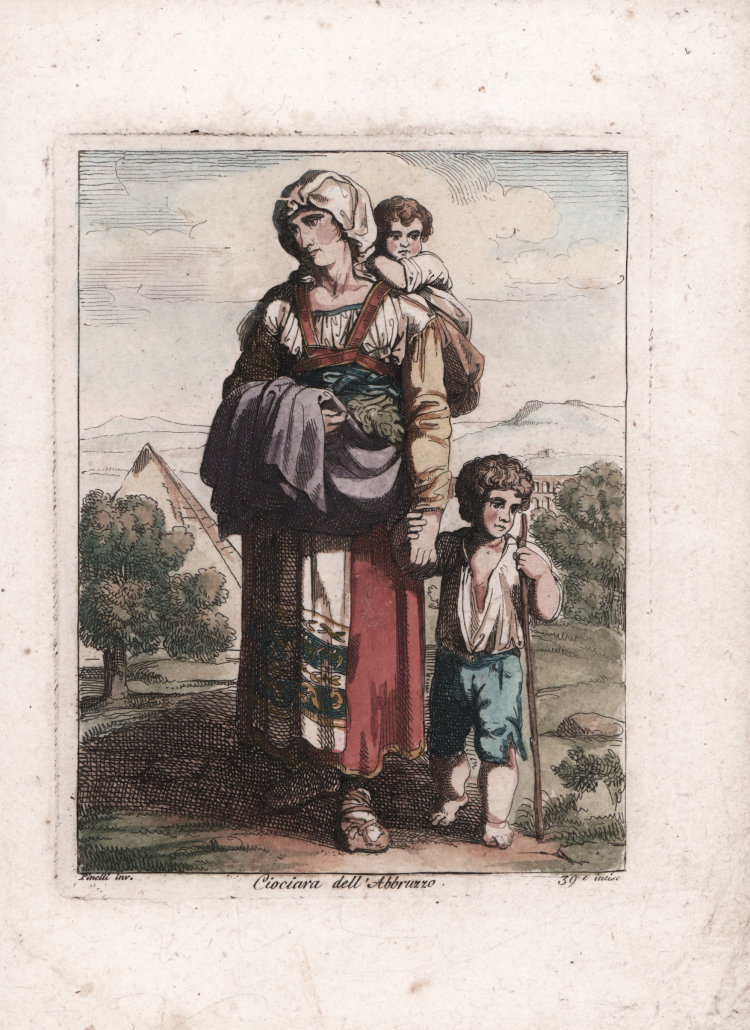



| Reference: | s19506 |
| Author | Bartolomeo PINELLI |
| Year: | 1810 ca. |
| Zone: | Abruzzi |
| Printed: | Rome |
| Measures: | 120 x 150 mm |


| Reference: | s19506 |
| Author | Bartolomeo PINELLI |
| Year: | 1810 ca. |
| Zone: | Abruzzi |
| Printed: | Rome |
| Measures: | 120 x 150 mm |
Popular costume from Nuova Raccolta di cinquanta motivi pittoreschi e costumi di Roma, 1810.
Rare and beautiful series, the second produced by the artist, depicting individual and group popular costumes, scenes and crafts not only of Rome and its surroundings, but also of Campania, Calabria and Abruzzi.
Italian printmaker, painter, sculptor and draughtsman. He learnt the rudiments of sculpture from his father, a maker of cheap religious statuettes. This early training encouraged Pinelli to emphasize plasticity and expression over the Neo-classical values prevalent in Rome. Although only a few of his terracotta figures survive however, he did produce a volume of etchings, Gruppi pittoreschi (Rome, 1834), depicting rustic groups. Its emphasis on naturalism and everyday subject-matter is also characteristic of his sculptures. Although he studied both at the Accademia di San Luca in Rome and at the Accademia di Belle Arti in Bologna, helped financially by Conte Lambertini, Pope Benedict XIV’s nephew, Pinelli was not interested in pursuing the traditional path to artistic success via religious or history painting. On returning to Rome in the late 1790s he chose to peddle his works at the cafés frequented by tourists.
Copperplate, finely hand coloured, in excellent condition.
Bartolomeo PINELLI (Roma, 1781 - Rome, 1835)
|
Italian printmaker, painter, sculptor and draughtsman. He learnt the rudiments of sculpture from his father, a maker of cheap religious statuettes. This early training encouraged Pinelli to emphasize plasticity and expression over the Neo-classical values prevalent in Rome. Although only a few of his terracotta figures survive however, he did produce a volume of etchings, Gruppi pittoreschi (Rome, 1834), depicting rustic groups. Its emphasis on naturalism and everyday subject-matter is also characteristic of his sculptures. Although he studied both at the Accademia di San Luca in Rome and at the Accademia di Belle Arti in Bologna, helped financially by Conte Lambertini, Pope Benedict XIV’s nephew, Pinelli was not interested in pursuing the traditional path to artistic success via religious or history painting. On returning to Rome in the late 1790s he chose to peddle his works at the cafés frequented by tourists.
|
Bartolomeo PINELLI (Roma, 1781 - Rome, 1835)
|
Italian printmaker, painter, sculptor and draughtsman. He learnt the rudiments of sculpture from his father, a maker of cheap religious statuettes. This early training encouraged Pinelli to emphasize plasticity and expression over the Neo-classical values prevalent in Rome. Although only a few of his terracotta figures survive however, he did produce a volume of etchings, Gruppi pittoreschi (Rome, 1834), depicting rustic groups. Its emphasis on naturalism and everyday subject-matter is also characteristic of his sculptures. Although he studied both at the Accademia di San Luca in Rome and at the Accademia di Belle Arti in Bologna, helped financially by Conte Lambertini, Pope Benedict XIV’s nephew, Pinelli was not interested in pursuing the traditional path to artistic success via religious or history painting. On returning to Rome in the late 1790s he chose to peddle his works at the cafés frequented by tourists.
|